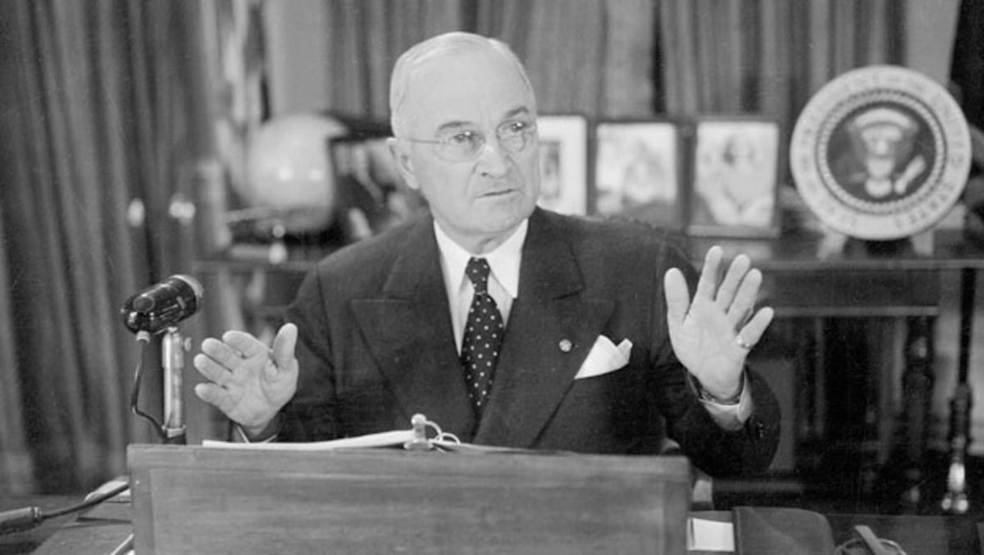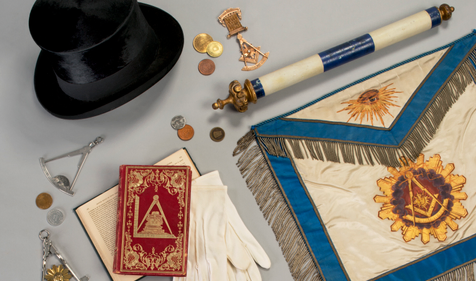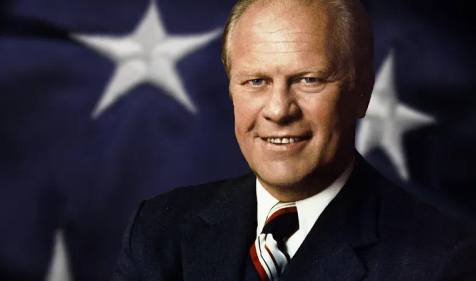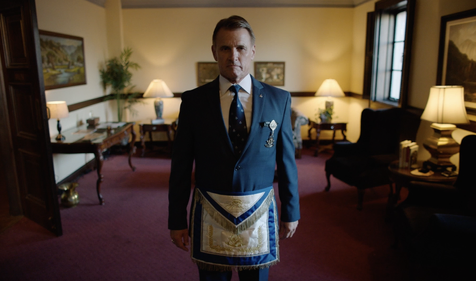This article details the life and career of President Harry S. Truman and his experience as a Freemason.
"You know that being an American is more than a matter of where your parents came from. It is a belief that all men are created free and equal and that everyone deserves an even break." – Harry S. Truman
In 1939, Harry S. Truman wrote, “Freemasonry is a system of morals which makes it easier to live with your fellow man, whether he understands it or not.” Few men were as devoted to the teachings of our fraternity as President Truman. He believed in following the core tenants of Brotherly Love, Relief, and Truth as a way of bettering the world and himself. As long and storied as his career in government was, so was his journey in Freemasonry. To this day, Masons look upon his many accomplishments as an example of how to conduct oneself with integrity.

The Boy from Independence
The eldest child of John Anderson Truman and Martha Ellen Young Truman, Harrison S. Truman was born in Lamar, Missouri on May 8, 1884. Often questioned, the “S” in Truman’s signature did not stand for any actual name but. Rather, was a compromise between Truman’s two grandfathers, Anderson Shipp Truman and Solomon Young.
His father was a farmer, moving the family to Independence, Missouri, so he could attend the Presbyterian Church Sunday School when young Harry was six years old. As a child, his mother fostered in him a love for reading, history, and the piano, which he practiced until he was 15.
His first experience in politics came while Truman was still a teenager; in 1900, he worked as a page at the Democratic National Convention in Kansas City. His father had close relations in the party, planting the seed in young Harry that would ultimately guide him towards a career as a politician. Upon graduating from Independence High School, the following year, Harry spent a year studying bookkeeping at Spalding's Commercial College, a Kansas City business school.
Truman sets to labor
To this day, Truman remains the only president since William McKinley who did not earn a college degree. After a year in college, he left to make a living, working a series of jobs over the next five years. These included a job as a timekeeper on the Atchison, Topeka & Santa Fe Railway, a few clerical positions, and a brief stint working in the mailroom of The Kansas City Star. While living in Kansas City, Truman also worked as a clerk alongside his brother, Vivian, at the National Bank of Commerce.
In 1906, he returned to his family’s farm where he lived until the United States entered the First World War in 1917. From 1905 to 1911, Harry served in the Missouri National Guard, attaining the rank of corporal. Although his vision was horrendous, he secretly memorized the eye chart and passed the induction test on his second try.

In 1909, Harry became a Freemason and set himself enthusiastically to work in the community. The Masons were a vital part of Truman's social life, and he studied Masonic ritual tirelessly, taking an active role at several lodges in Jackson County. Two years after he became a Mason, Truman led the effort to organize Masonic Lodge 618 in Grandview.
He was elected as the lodge’s first Master, and it was then that he had his first taste of leadership. He enjoyed the thrill of being a leader among his Masonic brothers, and it helped him overcome the severe shyness he endured as a child and young man. When he was elected in 1911 to lead the lodge, he wrote his future wife, Bess Wallace: "I have the big head terribly." After his initial term as Master of the lodge, he served as secretary for several years and was elected Master for the second time in 1916.
A leader is born
When MWB Truman served in France during World War I, he put his newfound leadership skills to use as an artillery officer and, eventually, a battery commander. Between his military experience and impressive record in the National Guard, he had a golden opportunity to carve out a political career upon his return to the States in 1919 and he seized it, but not before he married his longtime sweetheart, Bess.
In 1922, Truman, with the backing of the Kansas City Democratic apparatus, was elected as County Court judge of Jackson County's eastern district. Two years later, he lost his 1924 reelection campaign during the Republican wave led by President Calvin Coolidge's landslide election. Forced to return to the private sector, he quickly realized it was not for him, deciding to run for presiding judge, ultimately winning two terms in 1926 and 1930.
Jackson County implemented the Ten-Year Plan under Truman; a massive public works project focused on building new infrastructure in Kansas City. After his second term, he was elected to represent Missouri in the United States Senate, where he would serve until 1945. During his tenure in the Senate, he distinguished himself for his bipartisanship, earning the nickname “Give ‘em Hell Harry.” He chaired the Truman Committee responsible for rooting out issues within the federal government war contracts, helping him gain national acclaim within the Democratic Party.
President Harrison Truman
As President Franklin D. Roosevelt ran for his fourth term, Truman was selected to be his running mate, replacing former Vice President Henry Wallace. He was sworn in as vice president on January 20, 1945, and 82 days later succeeded to the presidency following President Roosevelt’s death.
The most defining and controversial moment in Truman’s presidency came within weeks of him assuming office. Despite the surrender of Germany, the war with Japan went on, and rather than launch a full-scale ground invasion of the country, Truman chose to use atomic bombs in Hiroshima and Nagasaki and force his adversary’s hand. In his eyes, this terrible act was the lesser of two evils, allowing the United States to spare the lives of untold numbers of American and Japanese soldiers.

After the war, economists anticipated a postwar depression. However, it never materialized as the Truman administration successfully guided the United States through the economic challenges. In 1948, President Truman attempted and failed to pass the first ever civil rights legislation. Instead, he used his authority and executive order to install racial equality in federal agencies and the military.
In 1952, Truman opted not to seek reelection due to the strong polling by Republican Dwight D. Eisenhower. In his retirement, Truman founded his presidential library and wrote several memoirs.
Not Just a Man. A Mason.
There is a Truman White House anecdote of particular interest to Freemasons which occurred at the end of the war. As the building was undergoing repairs, President Truman reviewed the construction and noticed carvings on some of the stones in the original walls. The markings turned out to be the “signatures” of the stonemasons who worked on the original construction. As a gift to his brethren across the country, Truman gifted many of the stones to Grand Lodges across the United States.

Throughout his political career, Truman never neglected his duties as a Freemason. In 1940, he was elected Grand Master of the Grand Lodge of Missouri. In 1945, not only was Truman made President of the United States, but he also received the honor of 33rd degree Sovereign Grand Inspector General in the Scottish Rite's Supreme Council, Southern Jurisdiction. That same year, the Supreme Council, Northern Masonic Jurisdiction, awarded Truman its first Gourgas Medal, the Supreme Council's highest honor. On May 18th, 1959, MWB Truman was presented with the fifty-years award and was the only U.S. President to reach that golden anniversary in the fraternity.
Truman passed away from pneumonia in 1972 at Kansas City's Research Hospital and Medical Center at the age of 88. He and Bess are buried together at the Harry S. Truman Library and Museum in Independence, Missouri.
Related Stories
Discover additional Scottish Rite blogs and news on this topic.
-
The Meaning Behind Masonic Regalia
Inspiration
Read More about The Meaning Behind Masonic Regalia
-
A President and Freemason: Illustrious Brother, Gerald R. Ford Jr., 33°
History
Read More about A President and Freemason: Illustrious Brother, Gerald R. Ford Jr., 33°
-
Supreme Council Unveils “Mirror” and “Judge”
News
Read More about Supreme Council Unveils “Mirror” and “Judge”



